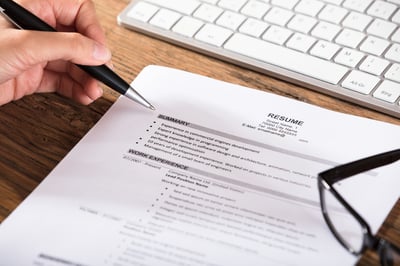

Cover letters aren't dead, but they are evolving.
When was the last time you wrote a cover letter? For many of us, it's been years since we dusted off our resume, updated our LinkedIn, or wrote a cover letter for a new position.
It wasn’t until I graduated, jobless and floundering, that I really understood the importance of cover letters. But with technology booming and most jobs being screened by applicant tracking systems, I had to wonder whether cover letters even mattered anymore. Cover letters are tricky because there's no standard for how to do them correctly. What might seem fine to one HR manager could annoy another.
My concerns were probably not unlike yours:
It was, and still is, difficult for me to determine exactly how to strike a balance in my cover letter. Even know the expert opinion seems torn on whether or not cover letters are worth the time it takes to write them.
It’s possible you’re in the same predicament: trying to make an impression without soiling your chances at a dream job. In this article, you’ll learn everything you need to know about how to write an effective cover letter that still reads as human.
|
Interested in learning more about a specific topic regarding cover letters? Use the links below to jump ahead: |
To understand how to write a cover letter, it's best to first understand why you are writing one. The buzz around cover letters recently has declared that they are boring, useless, stupid, and a waste of time. Even the top Google results don't seem to have a nice thing to say about them.
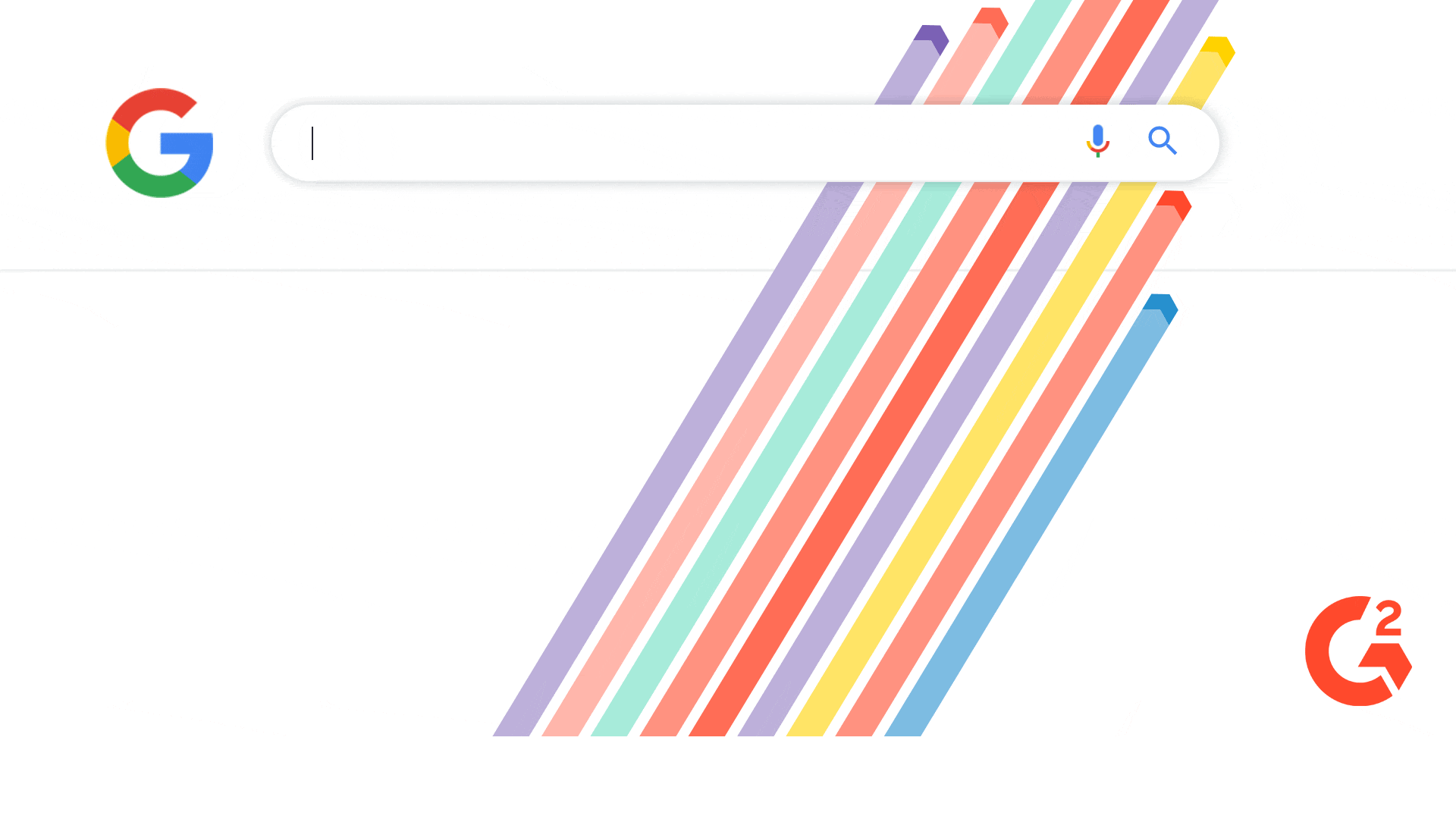
All that aside, the bottom line is that most job applications require or at least have the option to include a cover letter in your submission. If you're not using your cover letter to your advantage then you could be leaving the door open for someone to beat you out for a job.
For this reason alone it's smart to include a cover letter in every job application that asks for one. But what should you include in your cover letter, how should it be ordered, and what are the different formats you can use to stand out? Let's break each of those down.
There is a single correct way to format a cover letter because every cover letter should be unique to the job you're applying to. Depending on whether you're making a career change, moving cities, or just looking to take on a new challenge, your cover letter format will change.
Luckily the anatomy of a cover letter stays pretty uniform, even if the contents don't.
The first section of your cover letter is the header.You should format the header of your cover letter just as you'd format a formal letter.
This section isn't very complicated, but making sure you do it right is important. This is your first introduction to whoever is reading our cover letter, so pay close attention to it!
|
Here's what you should include in your cover letter header:
|
Remember to include a professional email address, not the funny one you made in high school. If you’re currently employed, refrain from using a work email as a form of contact for this application. You could also choose to include your physical address in the header image, should you feel it provides you an advantage over other candidates.
| Tip: If you're applying for a job out of state, simply put "Relocating to XYZ city" in place of your current city. You can explain further in your cover letter. |
Once a hiring manager has looked over the header, they'll jump to your introduction next. It's important to make a splash in this section and catch the readers attention right away. Think of this the same way you might think of a book synapsis. You have a small window of time to pique their interest with what you say next.
|
Here's what you should include in your introduction:
|
That all sounds pretty standard, what can you do to make all of that information meaningful?
Have you ever been called the wrong name at a party? Or maybe you've been talking to someone and you can tell they don't know your name? Hiring mangers deal with this every time they read a cover letter that starts, "Dear Sir and/or Madam..."
Taking the time to find the correct contact information for the hiring manager will help you stand out more than you know.
If the hiring manager’s name and title aren’t immediately clear, do some research. Go to the company’s LinkedIn profile to see who your manager might be. Look at the company’s teams page to see if they have a directory of staff. If you're working with a recruiter, ask them for the hiring manger's name.I guarantee it will make a difference for someone to see you’ve addressed them by name.
| Tip: If you can’t find their name after all of your searching, the company name or a simple "To Whom It May Concern..." will work just fine. |
This next section of your introduction is all about how you wrap yourself up in the right package.Begin making an impression this early in the letter by highlighting why you're the right person for the job. The point here is to state your interest and grab hold of their attention.
Be sure to begin by restating the position for which you are applying. Next, briefly outline or describe an experience or achievement that makes you uniquely qualified for the open position. This paragraph should be no more than a few sentences.
In the second and potentially third paragraph, you’ll go into more detail regarding why you are a good fit for the role.
Remember that hiring managers are reading potentially hundreds of these letters. “I studied this subject in school” or “I have done this job for years” is not going to leave a lasting impression. Instead, express your interest in the role in a new and compelling way. Perhaps include a sentence showing you understand the the type of candidate they’re looking for.
|
Explain your experience in a way that renders you uniquely qualified:
|
Give specific examples, and include proof if you can. Quantify everything you can with data. If you’re a salesperson, include your quarterly earnings. If you’re a writer, list some publications that have published you and include your portfolio.
One easy way to do this is to look at the specific requirements or responsibilities of the role listed in the job posting. They are so clearly laid out for you and you’d be a fool not to utilize them!
| Example:If the description says they need someone to completely revamp their website, include how you redesigned your last company’s entire digital presence and increased overall site traffic by 37 percent. |
Hiring managers want to feel as though you’re excited for this role in particular, not just the shot at a change of pace or a higher paying salary. For this reason, you may consider including a paragraph displaying your research on the company and the reasons you believe this organization, in particular, is the right place for you.
This type of paragraph shows the time you’ve spent to make your cover letter specific to the job at hand. This type of personability will have a positive effect on those reviewing your letter as they will feel like you’re specifically here for the job.
One simple formula for the second paragraph is to take a bit of knowledge you have about the company, state it, and explain why it is interesting or compelling to you. Are they growing at a rapid rate? Take the opportunity to state your passion for scaling organizations and the culture changes that accompany growth.
An easy way to do this is to set up Google News alerts for the company you're targeting to find the latest information about the company. Also, check out their social media accounts and see if they've been posting about any new projects.
Another tip? Find out what they're not doing and highlight your experience with those projects. Companies hire people to fill knowledge gaps and bring new expertise. If you can strike a chord with them about something they struggle with, you'll be sure to catch their eye.
One big mistake people make is thinking their experiences are limited to their professional life. If you volunteer, have a side-hustle, or a hobby, there's a chance that you have related transferable skills from these experiences that you can mention.
There are a ton of skills you might have picked up in your various walks of life:
| Planning | Organization | Time Management |
| Adaptability | Flexibility | Writing |
| Editing | Communication skills | Diversity in knowledge |
| Interpersonal skills | Relationship management | Customer service |
| Problem Solving | Teamwork | Management experience |
| Analytic / Research skills | Data analysis | IT / Technical skills |
| Numeracy | Positive attitude | Attention to detail |
If you're having trouble thinking about how your experience relates to the job posting these transferable skills can help fill in the experience gaps you might have in your professional career.
After the third paragraph, it’s about time to wrap up the cover letter.
You’ll want to close out your cover letter with a short and concise conclusion paragraph. You don’t want to take too much time from the people with hiring powers. It’s better they feel you’ve respected their time with a cover letter of a reasonable length as opposed to rambling on.
Many recommend your conclusion to have a call to action, such as meeting up for a discussion or getting their thoughts on the future of the industry. When the hiring manager is done reading your letter, what do you want their next action to be?
| Tip: Many take this opportunity to reiterate how interested they are in the role. Don’t do that. The hiring manager understands your interest, as well as the interest of 50 other applicants. |
They’re not just looking for someone who wants the role, but also for someone who can perform it well. Instead of ending the letter by begging, end it by reiterating your knowledge and making another lasting impression.It’s possible they’ll act on it, it’s possible you’ll never hear from them. Either way, you’re opening up the dialogue and expressing your interest.
After this, you’ll need to more formally sign out of the letter with a sincerely, best, or kind regards before your name. Although your name is at the beginning of the letter, it’s best you include it at the end as well.
|
If you want to make your cover letter stand out, use an e-signature software to digitally replicate your signature. |
The professional world has so many unwritten rules and barriers to entry that it’s easy to make a mistake in front of hiring managers without ever knowing you did anything wrong.
In journalism school, I once emailed a source, only to have them email my editor and the rest of the newspaper department outlining how unprofessional it was to ask questions over email.
You can bet I learned to never do that again. But you can also learn things without embarrassment, which is what I’m hoping to do for you now. Here are a few of the most common cover letter mistakes for you to review and avoid as you go after your dream job.
Remember that you’re trying to make a good impression with this letter. Respect the hiring manager’s time by cutting out paragraphs and words that don’t serve a purpose. When we’re nervous, we can sometimes be too wordy or do too much. Avoid this habit in a cover letter.
Addressing a person or company by the wrong name is unacceptable in a cover letter. In fact, it’s a surefire way to have your letter thrown away without further attention.
The least you can do is double check that you’ve addressed the letter correctly. Additionally, it doesn’t take much effort to research and figure out who is the hiring manager for this role.Take the extra ten minutes and address the letter with a specific name. This personalizes the experience and makes a stronger impression.
If you’re having trouble finding the name of a hiring manager and you’ve done all the research you can, feel free to write “Dear COMPANY NAME,” or “Dear TEAM NAME at COMPANY NAME.” This shows you’ve personalized it to the extent in which you are able.
Successful companies are built around teams and collaborators. If you’re using the words “I” or “me” too much in your cover letter, you risk coming off as someone who is seeking to serve their own interests.
Instead, try and change the wording to focus more on the way you can have an impact at the company. The cover letter is partially about your achievements, but mostly it’s about what you can do for this company.
This one’s tricky. There’s only so much you can say about your experience, education, etc. Especially if you’re fresh out of school, it can feel like you’re running out of things to say quickly.
Even so, be careful not to write a cover letter that simply repeats your resume or job application. A cover letter is an opportunity to self-advocate in a unique way. Try and use this space to outline experiences you’ve not yet been able to discuss.
Ideally, the people you’re applying to work with are compassionate and caring individuals who empathize with others. But it’s inappropriate to bring up your recent struggles or how you hated your last job in a cover letter.
For one, it’s unprofessional. And for two, you’ll look like someone who dwells on their issues as opposed to someone who is fully invested in the job at hand. When hiring, managers are asking themselves, “Will I enjoy working with this person?” You want to give them every reason to answer with a resounding yes.
While your intention is to land the job, it’s important to remember that hiring managers don’t owe you anything. Don't fall into the trap of begging or obsessing over why this is your dream company and you would be devastated if you didn't get the job. It might come off like you're willing to take any job, which could hurt your in the long run. Stay cool, calm, and confident.
Hiring managers read a lot of the same sentiments over and over. The least you can do is try and think of unique ways to discuss your skills and experience. Remember, when it comes to getting a job, you want to put your best foot forward.
|
Here are some common cover letter cliches to avoid:
|
It wouldn't be enough to just preach about the best practices for writing a cover letter without asking the experts what they think.
We took to LinkedIn and asked industry experts what their opinions on cover letters are, the best examples they've seen, and how you can optimize your cover letter for success. Here are some of the highlights:
| Related: Get ahead of the competition and learn how to use to LinkedIn effectively. |
Many of our career experts were quick to point out that your cover letter is the perfect chance to explain a non-linear resume, absence in work, or career change.
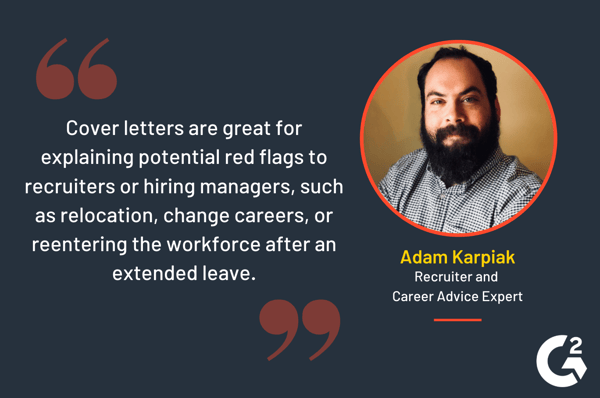
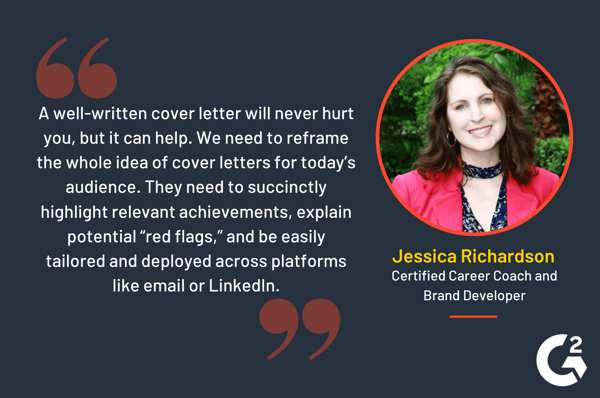
Another common piece of advice we saw was recruiters and career experts advising against half-baked cover letters.
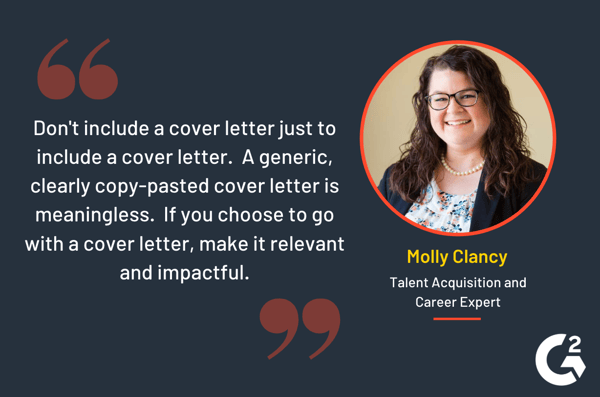
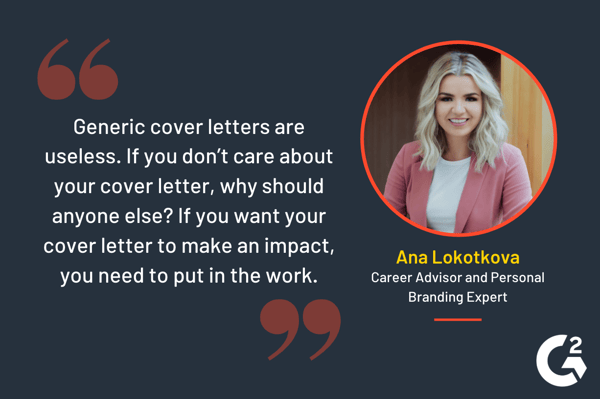
Several of our experts expressed frustration at reading an incredible cover letter, only to be let down by a subpar resume attached to it.
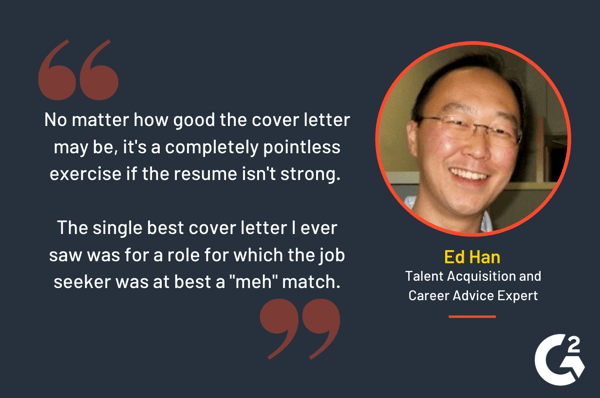
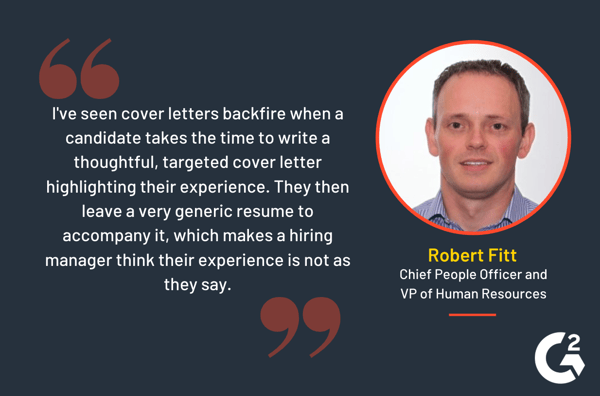
As some experts pointed out, most recruiters use applicant tracking systems to resume parse and extract the important information to determine if you're qualified.
That said, a cover letter can have a big impact if you make it far enough in the recruiting process to have it read by a hiring manager.
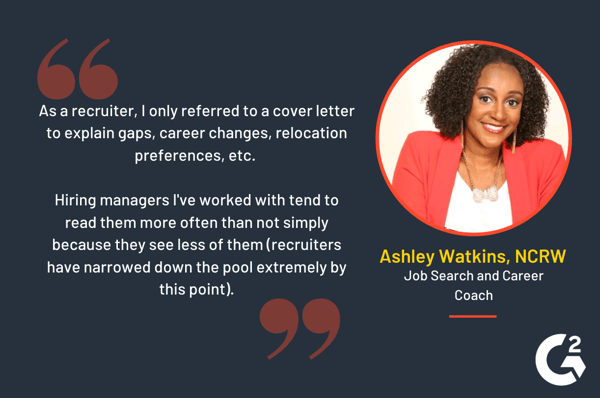
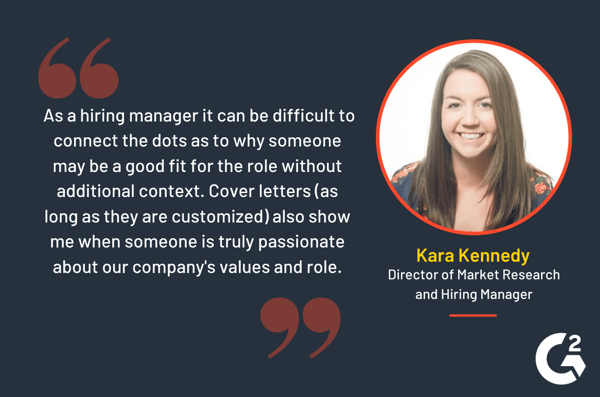
As you can see above, even the experts disagree about the importance of a cover letter. The truth is that sometimes your hard work isn't rewarded. You might work tirelessly to write the perfect cover letter, only to have it tossed to the side.
While there's nothing you can do to control what happens with your cover letter, you can control the amount of effort and time you put into a cover letter.Who knows? The cover letter you spend lovingly crafting might be the thing that sets you apart for your dream job. That's time worth investing.
|
Ready to put everything you learned today into action? Download our complimentary cover letter template. |
Grace Pinegar is a lifelong storyteller with an extensive background in various forms such as acting, journalism, improv, research, and content marketing. She was raised in Texas, educated in Missouri, worked in Chicago, and is now a proud New Yorker. (she/her/hers)
So you’re applying for a job, huh?
 by Alexa Drake
by Alexa Drake
When you’re an employee, it’s easy to forget just how much behind the scenes work goes into...
 by Derek Doeing
by Derek Doeing
Do you think you’re a good judge of character? The position of a recruiter may be the perfect...
 by Derek Doeing
by Derek Doeing
So you’re applying for a job, huh?
 by Alexa Drake
by Alexa Drake
When you’re an employee, it’s easy to forget just how much behind the scenes work goes into...
 by Derek Doeing
by Derek Doeing
Never miss a post.
Subscribe to keep your fingers on the tech pulse.



